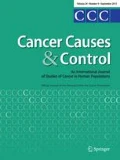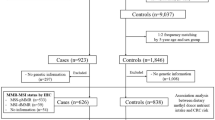Abstract
Background
Low dietary folate intake has been associated with colorectal cancer risk and adenoma recurrence. A C/T transition at position 677 in the gene encoding methlylenetetrahydrofolate reductase (MTHFR C677T) has been reported to interact with folate intake to modulate colorectal adenoma recurrence or cancer risk.
Methods
We investigated the association between MTHFR, total folate, and the risk of colorectal adenoma recurrence in the Polyp Prevention Trial. We compared 625 individuals with any adenoma recurrence after 4 years (266 individuals with multiple (≥2) recurrent adenomas and 101 individuals with advanced adenoma recurrence) to 978 individuals with no adenoma recurrence. Odds ratios (OR) and 95% confidence intervals (CI) for risk of adenoma recurrence were calculated using unconditional logistic regression. We also investigated effect modification of the MTHFR genotype associations by total folate intake.
Results
In general, no statistically significant associations were found between quartile of folate intake (dietary or total) and adenoma recurrence. The MTHFR CT genotype was associated with a significantly increased risk of multiple adenoma recurrence (OR: 1.34, 95% CI: 1.00, 1.81). No significant interaction was noted for total folate and MTHFR genotype, though an increased risk of recurrence noted for the MTHFR CT genotype was statistically significant only for those individuals with below median intake of total folate.
Conclusion
We report that the MTHFR 677 CT genotype was associated with increased risk of adenoma recurrence (specifically multiple adenoma recurrence) 4 years after polypectomy.
Similar content being viewed by others
Abbreviations
- CI:
-
Confidence interval
- CRC:
-
Colorectal cancer
- DFE:
-
Dietary folate equivalents
- FFQ:
-
Food frequency questionnaire
- MTHFR:
-
Methylenetetrahydrofolate reductase
- OR:
-
Odds ratio
- PPT:
-
Polyp prevention trial
- RR:
-
Relative risk
- SNP:
-
Single nucleotide polymorphism
References
World Cancer Research Fund/American Institute for Cancer Research (1997) Food, nutrition and the prevention of cancer: a global perspective. Washington, DC: American Institute for Cancer Research
Potter JD, Slattery ML, Bostick RM, Gapstur SM (1993) Colon cancer: a review of the epidemiology. Epidemiol Rev 15:499–545
Slattery ML, Boucher KM, Caan BJ, Potter JD, Ma KN (1998) Eating patterns and risk of colon cancer. Am J Epidemiol 148:4–16 Jul 1
World Cancer Research Fund/American Institute for Cancer Research. (2007) Food, nutrition, physical activity and the prevention of cancer: a global perspective. Washington DC AICR
Yetley EA, Rader JI (2004) Modeling the level of fortification and post-fortification assessments: U.S. experience. Nutr Rev 62:S50–S59; discussion S60–1 Jun
Powers HJ (2005) Interaction among folate, riboflavin, genotype, and cancer, with reference to colorectal and cervical cancer. J Nutr 135:2960S–2966S Dec
Freudenheim JL, Graham S, Marshall JR et al (1991) Folate intake and carcinogenesis of the colon and rectum. Int J Epidemiol 20:368–374 Jun
Kim YI (2007) Folate and colorectal cancer: An evidence-based critical review. Mol Nutr Food Res 51:267–292 Mar
Martinez ME, Giovannucci E, Jiang R et al (2006) Folate fortification, plasma folate, homocysteine and colorectal adenoma recurrence. Int J Cancer 119:1440–1446 Sep 15
Choi SW, Mason JB (2002) Folate status: effects on pathways of colorectal carcinogenesis. J Nutr 132:2413S–2418S Aug
Sanjoaquin MA, Allen N, Couto E, Roddam AW, Key TJ (2005) Folate intake and colorectal cancer risk: a meta-analytical approach. Int J Cancer 113:825–828 Feb 20
Van Guelpen B, Hultdin J, Johansson I et al (2006) Low folate levels may protect against colorectal cancer. Gut 55:1461–1466 Oct
Cole BF, Baron JA, Sandler RS et al (2007) Folic acid for the prevention of colorectal adenomas: a randomized clinical trial. Jama 297:2351–2359 Jun 6
Kim YI (2004) Folate, colorectal carcinogenesis, and DNA methylation: lessons from animal studies. Environ Mol Mutagen 44:10–25
Hoffman RM (1984) Altered methionine metabolism, DNA methylation and oncogene expression in carcinogenesis. A review and synthesis. Biochim Biophys Acta 738:49–87
Frosst P, Blom HJ, Milos R et al (1995) A candidate genetic risk factor for vascular disease: a common mutation in methylenetetrahydrofolate reductase. Nat Genet 10:111–113 May
van der Put NM, Gabreels F, Stevens EM et al (1998) A second common mutation in the methylenetetrahydrofolate reductase gene: an additional risk factor for neural-tube defects? Am J Hum Genet 62:1044–1051 May
Kono S, Chen K (2005) Genetic polymorphisms of methylenetetrahydrofolate reductase and colorectal cancer and adenoma. Cancer Sci 96:535–542 Sep
Giovannucci E, Chen J, Smith-Warner SA et al (2003) Methylenetetrahydrofolate reductase, alcohol dehydrogenase, diet, and risk of colorectal adenomas. Cancer Epidemiol Biomarkers Prev 12:970–979 Oct
Hirose M, Kono S, Tabata S et al (2005) Genetic polymorphisms of methylenetetrahydrofolate reductase and aldehyde dehydrogenase 2, alcohol use and risk of colorectal adenomas: self-defense forces health study. Cancer Sci 96:513–518 Aug
Marugame T, Tsuji E, Inoue H et al (2000) Methylenetetrahydrofolate reductase polymorphism and risk of colorectal adenomas. Cancer Lett 151:181–186 Apr 14
Ulrich CM, Kampman E, Bigler J et al (1999) Colorectal adenomas and the C677T MTHFR polymorphism: evidence for gene-environment interaction? Cancer Epidemiol Biomarkers Prev 8:659–668 Aug
Levine AJ, Siegmund KD, Ervin CM et al (2000) The methylenetetrahydrofolate reductase 677C–>T polymorphism and distal colorectal adenoma risk. Cancer Epidemiol Biomarkers Prev 9:657–663 Jul
Schatzkin A, Lanza E, Corle D et al (2000) Lack of effect of a low-fat, high-fiber diet on the recurrence of colorectal adenomas. Polyp prevention trial study group. N Engl J Med 342:1149–1155 Apr 20
Block G, Hartman AM, Dresser CM et al (1986) A data-based approach to diet questionnaire design and testing. Am J Epidemiol 124:453–469 Sep
Mares-Perlman JA, Klein BE, Klein R et al (1993) A diet history questionnaire ranks nutrient intakes in middle-aged and older men and women similarly to multiple food records. J Nutr 123:489–501 Mar
Flood A, Caprario L, Chaterjee N et al (2002) Folate, methionine, alcohol, and colorectal cancer in a prospective study of women in the United States. Cancer Causes Control 13:551–561 Aug
Sansbury LB, Bergen AW, Wanke KL et al (2006) Inflammatory cytokine gene polymorphisms, nonsteroidal anti-inflammatory drug use, and risk of adenoma polyp recurrence in the polyp prevention trial. Cancer Epidemiol Biomarkers Prev 15:494–501 Mar
Kokoris M, Dix K, Moynihan K et al (2000) High-throughput SNP genotyping with the Masscode system. Mol Diagn 5:329–340 Dec
Martinez ME, Thompson P, Jacobs ET et al (2006) Dietary factors and biomarkers involved in the methylenetetrahydrofolate reductase genotype-colorectal adenoma pathway. Gastroenterology 131:1706–1716 Dec
van den Donk M, Buijsse B, van den Berg SW et al (2005) Dietary intake of folate and riboflavin, MTHFR C677T genotype, and colorectal adenoma risk: a Dutch case–control study. Cancer Epidemiol Biomarkers Prev 14:1562–1566 Jun
Hubner RA, Muir KR, Liu J-F et al (2006) Folate metabolism polymorphisms influence risk of colorectal adenoma recurrence. Cancer Epidemiol Biomarkers Prev 15:1607–1613 September 1, 2006
Ryan BM, Molloy AM, McManus R et al (2001) The methylenetetrahydrofolate reductase (MTHFR) gene in colorectal cancer: role in tumor development and significance of allelic loss in tumor progression. Int J Gastrointest Cancer 30:105–111
Slattery ML, Potter JD, Samowitz W, Schaffer D, Leppert M (1999) Methylenetetrahydrofolate reductase, diet, and risk of colon cancer. Cancer Epidemiol Biomarkers Prev 8:513–518 Jun
Winawer SJ, Zauber AG, Fletcher RH et al (2006) Guidelines for Colonoscopy Surveillance after Polypectomy: A Consensus Update by the US Multi-Society Task Force on Colorectal Cancer and the American Cancer Society. CA Cancer J Clin 56:143–159 May 1, 2006
Bonithon-Kopp C, Piard F, Fenger C et al (2004) Colorectal adenoma characteristics as predictors of recurrence. Dis Colon Rectum 47:323–333 Mar
Robertson DJ, Greenberg ER, Beach M et al (2005) Colorectal cancer in patients under close colonoscopic surveillance. Gastroenterology 129:34–41 Jul
Winawer SJ, Zauber AG, O’Brien MJ et al (1993) Randomized comparison of surveillance intervals after colonoscopic removal of newly diagnosed adenomatous polyps. The National Polyp Study Workgroup. N Engl J Med 328:901–906 Apr 1
Acknowledgments
This study was funded by the Intramural Research Program, National Cancer Institute, NIH, Bethesda, MD. Dr Murphy is supported by the Ireland-Northern Ireland-National Cancer Institute Cancer Consortium and the Health Research Board of Ireland.
Author information
Authors and Affiliations
Corresponding author
Additional information
Leah B. Sansbury, Amanda J. Cross, and Rachael Stolzenberg-Solomon have contributed equally to this work.
Rights and permissions
About this article
Cite this article
Murphy, G., Sansbury, L.B., Cross, A.J. et al. Folate and MTHFR: risk of adenoma recurrence in the Polyp Prevention Trial. Cancer Causes Control 19, 751–758 (2008). https://doi.org/10.1007/s10552-008-9137-6
Received:
Accepted:
Published:
Issue Date:
DOI: https://doi.org/10.1007/s10552-008-9137-6



